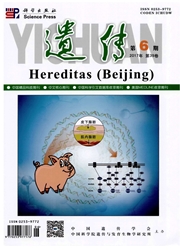

 中文摘要:
中文摘要:
母猪分娩期间的母性行为对新生仔猪的成活致关重要,失败的母性行为如杀婴行为和压仔行为等经常在一些母猪中发生,给养猪业造成巨大的经济损失,给仔猪福利带来严重影响。前列腺素F2α不但可促发母猪产前的做窝行为,而且通过其受体基因(PTGFR)编码的蛋白FP在母猪繁殖过程和母性行为中发挥重要作用。文章以白色杜洛克×二花脸资源群体为材料,对PTGFR基因进行了SNP搜寻并分析其与母猪产前做窝行为、产后杀婴行为和压仔行为的关联性。结果:在PTGFR基因的两个外显子中共搜寻到5个同义突变SNP。选择Exon1g.250A〉G、Exon1g.619G〉A和Exon2g.483T〉C3个SNP在F0、F1个体和289头F2母猪中进行了基因型判定。基于家系基础上的传递不平衡(TDT)分析结果显示,PTGFR基因的3个SNP及单倍型与母猪做窝行为、杀婴行为和压仔行为均未达到显著相关(P〉0.05)。所以PTGFR基因可能并不是影响母猪母性行为的主效候选基因。
 英文摘要:
英文摘要:
Maternal behaviors of sows around parturition are important for survival of newborn offspring.Failure to establish normal maternal bonds such as maternal infanticide and crushing often occurs in some individuals.It causes both significant economic losses to the pig industry and severe problems of piglet welfare.Prostaglandin F2-alpha not only can stimulate the nest-building behavior of sows before parturition but also plays an important role in reproductive process and maternal behavior through protein FP encoded by the prostaglandin F receptor gene(PTGFR) as its receptor.In this study,genetic variation and association study of PTGFR gene with nest-building behavior,maternal infanticide,and crushing behavior was carried out in a White Duroc × Erhualian resource population.As a result,five synonymous mutations were identified on exon 1 and exon 2.Exon 1 g.250 A〉G,Exon 1 g.619 G〉A and Exon 2 g.483 T〉C were chosen for genotyping in individuals of F0,F1 and 289 F2 sows.Family-based transmission disequilibrium test(TDT) demonstrated that there were no significant associations of 3 SNPs and haplotypes of PTGFR gene with sow nest-building,maternal infanticide and crushing behavior(P 〉 0.05).Therefore,it can be concluded that PTGFR gene is not the causative candidate gene for sow maternal behaviors.
 同期刊论文项目
同期刊论文项目
 同项目期刊论文
同项目期刊论文
 期刊信息
期刊信息
